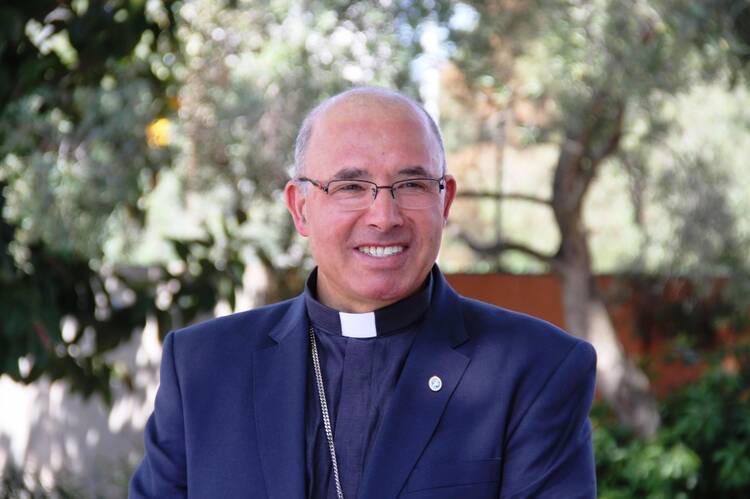Four days after he left Lisbon, where he had presided at the closing celebrations for World Youth Day, Pope Francis appointed Bishop Rui Manuel Sousa Valério, 59, the Portuguese military ordinary and a Montfort Missionary, as the new Latin patriarch of Lisbon. He did so after accepting the resignation of the former patriarch, Cardinal Manuel de Nascimento Clemente, who celebrated his 75th birthday—the ordinary retirement age for bishops—on July 16. The cardinal had been in poor health and hoped to retire.
Bishop Valério’s nomination came as a surprise to many, since Pope Francis had named Américo Manuel Alves Aguiar, auxiliary bishop of Lisbon, a cardinal on July 9. It had been wrongly presumed then that the pope would appoint the cardinal-elect as the new patriarch after the World Youth Day celebrations, given that Bishop Aguiar was also the chief organizer of that successful event.
It seems clear now, however, that the Jesuit pope had another plan in mind when he named Bishop Alves Aguiar cardinal; it is likely that he will bring him to Rome and give him a position of high responsibility in the Roman Curia.
It seems clear now that Pope Francis had another plan in mind when he named Bishop Alves Aguiar cardinal; it is likely that he will bring him to Rome and give him a position of high responsibility in the Roman Curia.
It is worth mentioning that the appointment of Bishop Rui Valério is yet another instance in which Pope Francis has decided to accept the resignation of a bishop who has reached the age of 75 and replace him with a man in his 50s. He did the same earlier this year in other important archdioceses, including Buenos Aires, Toronto, Madrid and Brussels, and is expected to do likewise over the next year in other major archbishoprics worldwide, including in the United States.
Bishop Valério, for his part, posted a message on the Lisbon patriarchate’s website in which he spoke about receiving the news of his appointment, describing his feelings of “fear and trembling,” an “intention to listen” and “the joy of service.”
The patriarch-elect said he gave his assent “conscious of my own fragility, but more so out of love for Christ and his church, and in strict fidelity to the Holy Father and a spirit of obedience.”
He will take possession of the patriarchal see on Sept. 2 and will have a solemn Mass for his installation at the Jerome Monastery on Sunday, Sept. 3.
Why does Lisbon have a patriarch rather than an archbishop?
While the Diocese of Lisbon was established in the fourth century, by the 1700s it was ecclesiastically divided into two dioceses: Eastern Lisbon and Western Lisbon. In 1716, at the request of King John V of Portugal, Pope Clement XI raised the western diocese to the rank of patriarchate, and in 1737, again at the request of the king, Clement XI’s successor, Pope Clement XII, decreed that the patriarch would henceforth become cardinal in the consistory following his installation. Later still, Eastern Lisbon and Western Lisbon were united into one diocese under the patriarch.
The patriarch-elect said he gave his assent “conscious of my own fragility, but more so out of love for Christ and his church, and in strict fidelity to the Holy Father and a spirit of obedience.”
Pope Francis, however, did not follow the 1737 decree in the case of Patriarch Manuel Clemente, the retiring patriarch, and made him cardinal only in the second consistory after his installation. It is probable that he will follow suit with the new patriarch, because Cardinal Clemente will still be a cardinal-elector, eligible to vote in a conclave for the next pope, for the next five years.
When Bishop Rui Valerio takes over as patriarch on Sept. 3, he will become pastor to 1,462,050 Catholics. They are served today in 285 parishes and 619 churches by 281 diocesan priests and 250 priests belonging to religious orders, as well as by 95 permanent deacons. The patriarchate also has 368 men religious, 1,090 women religious and 51 seminarians. It is responsible for 169 educational institutes.
Who is Bishop Valério?
Bishop Valério was born on Christmas Eve 1964 in Ourém in the Diocese of Leira-Fátima. He studied in Rome, graduating with a degree in philosophy from the Pontifical Lateran University and a licentiate in dogmatic theology from the Jesuit-run Gregorian University. He also studied philology at Rome’s La Sapienza University and spirituality at the International Montfortian Center in Louvain, Belgium. On Oct. 6, 1990, he made his religious profession in the Company of Mary (the Montfort Missionaries), an international religious order founded at the beginning of the 18th century by St. Louis-Marie Grignion de Montfort, dedicated to the establishment of the kingdom of God under the patronage of Mary, the Mother of Jesus. The order today has just under 1,000 priests and brothers, who carry out their mission in some 30 countries worldwide.
Bishop Valério was ordained a priest on March 23, 1991, and served in parishes in Rome, in the Diocese of Beja, Portugal, and in the Patriarchate of Lisbon. He also served as military chaplain to the Portuguese navy’s hospital and school in Lisbon. He has held various roles in his religious order, including as superior of the Portuguese province.
Pope Francis named him military ordinary, that is, bishop of the Armed Forces of Portugal, on Oct. 27, 2018. He was ordained bishop a month later. On Aug. 10, 2023, Francis named him patriarch of Lisbon.








